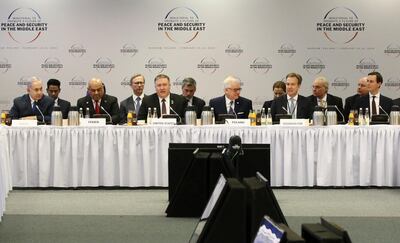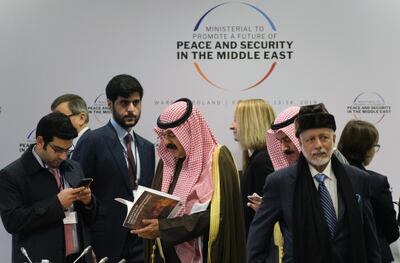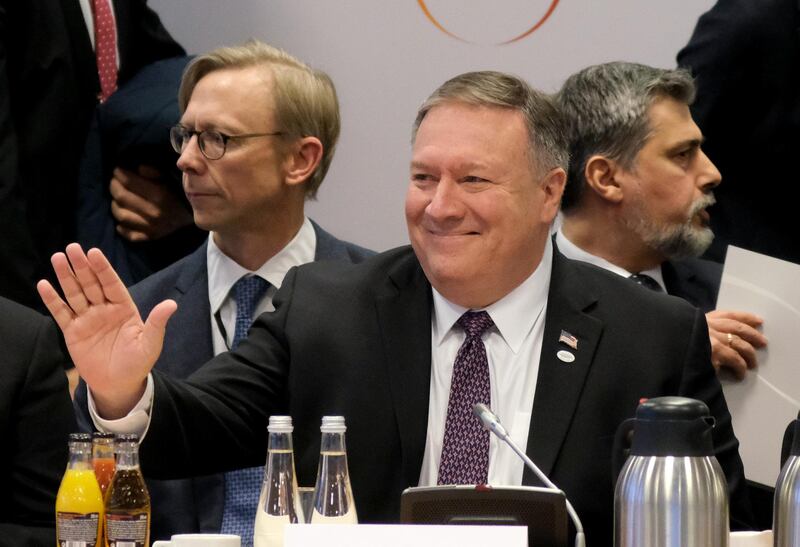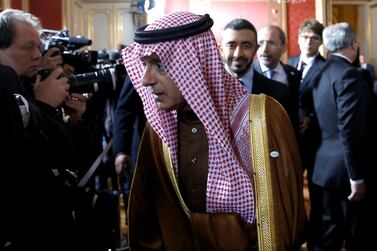America vowed to intensify its confrontation with Iran as a Middle East summit in the Polish capital put the focus on the region’s main challenges including Yemen, Syria and the White House’s promised Palestinian peace plan.
Mike Pompeo, the US Secretary of State, told an opening plenary that the summit represented an opportunity for new action to tackle conflicts.
"The United States seeks a new era of co-operation between all of our countries on how to confront these issues," Mr Pompeo told foreign ministers and other officials from more than 60 countries in Warsaw.

A strong compliment of senior regional diplomats attended the meeting, including Sheikh Abdullah bin Zayed Al Nahyan, Minister of Foreign Affairs and International Cooperation.
Speaking alongside his Polish counterpart, Mr Pompeo included Iran in a list of regional challenges
ranging from Syria and Yemen to Palestinian-Israeli peace.
We join the #WarsawSummit to take a firm stand against forces that threaten the future of peace&security in the region, especially the world's leading sponsor of terrorism: the Iranian regime that continues to destabilize our region and launch ballistic missiles against civilians
— Khalid bin Salman خالد بن سلمان (@kbsalsaud) February 13, 2019
"None of the region's challenges will solve themselves. We must work together for security," he said. "No country can afford to remain on the sidelines.”
In remarks before the opening, Mr Pompeo was more direct in targeting Iran, calling it a very real threat.
“They’re a malign influence,” he said. “The three H’s — the Houthis, Hamas, Hezbollah — these are real threats. There are others as well, but you can’t get peace in the Middle East without pushing back against Iran.”
At a closing press conference, Mr Pompeo said there had not been a single defender of Iran against the accusations laid by the US and others. These had ranged from regional meddling, including the Iranian role in Iraq, to Hezbollah networks in South America. "No country spoke out against the basic facts," he said.
As co-hosts, Poland had been embarrassed by the emphasis put on Iran at the summit, especially as leading EU foreign ministers declined invites. Jacek Czaputowicz, the foreign minister, quietly took pains to say the Iranian issue had not dominated the discussions in the way that was portrayed.
Some embarrassment surrounded the meeting after Benjamin Netanyahu declared that the summit would “advance the common interest of war with Iran”.
A social media post of the clip was later retracted.
Mr Netanyahu sat alongside Khaled Al Yamani, the Yemen foreign minister, at a top table that included at the other end Jared Kushner, the US president’s special adviser and author of a much-anticipated peace plan for the Middle East.
When Mr Netanyahu was asked to speak to the meeting in Warsaw's main football stadium, a technical failure meant he used Mr Yemani's microphone.
At a closed-door session in the afternoon, Mr Kushner was due to brief officials on his plan but US officials said concrete details would be held back in light of the Israeli general election due on April 7. Nonetheless, diplomats hope the session will “test” the ideas behind Mr Kushner’s work.
Another focus of the summit is expected to be Iran's missile proliferation. US reports have suggested that America, under Mr Pompeo's influence as head of the CIA and now secretary of state, has resumed efforts to sabotage the Iranian programme.
Two rocket test failures on January 15 and February 5 are seen as the product of that covert activity.
The European countries attending the 60 nation summit largely see eye to eye on the need to stop Iran’s missile advances and the topic offers a bridge over gaps between the two sides. “We disagree about the Iran nuclear deal but we share the same threat assessment, especially on missile testing and missile proliferation,” said Brian Hook, Special Representative for Iran at the State Department.

At another parallel session in the afternoon, Sigal Mandelker, the undersecretary of the Treasury for terrorism and financial intelligence, will lead a discussion on tightening sanctions and Iran's abuse of the SWIFT international financial settlement system, according to officials.
Among the most notable invitees to refuse to attend were Palestinian representatives.
Nabil Shaath, a senior official, said the White House refusal to accept Palestinian statehood as the basis of the Kushner plan made it impossible for his side to attend. “The Trump team aims to use this conference as an event to push for their vision for Israel and Palestine, one that, based on the steps they have taken, is certainly not about peacemaking,” Mr Shaath said.
After a suicide bomb killed 27 Revolutionary Guard troops, Iran’s foreign minister Mohammad Javad Zarif said it was “no coincidence that Iran is hit by terror on the very day … [the] Warsaw Circus” began.






